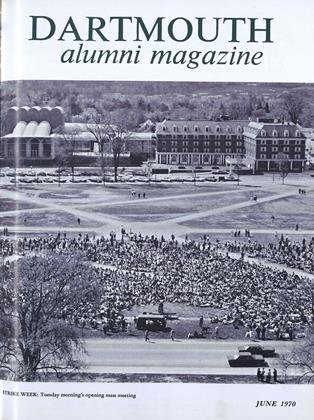CONFRONTED with a war he abhors and a society with which he finds fault, today's college student is often caught in a painful quandary. The traditional methods of "working within the system" seem to have little positive effect, yet violent protest only serves to further polarize the country and lead to repressive policies. How is change to be effected? What can be done?
Continuing Presence in Washington is the creation of a large group of Dartmouth students, under the leadership of Prof. Denis Sullivan of the Government Department, who believe that a way out of this dilemma exists. That way, as the name connotes, consists of maintaining a massive presence in Washington of people from all walks of life opposed to the war and lobbying effectively against it. The purpose of CPW is to provide the communications, logistical support, and know-how to coordinate just such a massive lobbying effort.
President Kemeny spoke to the entire College by radio on Monday night. By the time of the mass meeting on the green the next morning a Dartmouth group had already formulated a response to President Kemeny's remarks and announced its purpose to organize a national citizens' lobby to end United States military involvement in Southeast Asia, and its goal to utilize students as a catalyst group to encourage the tax-paying and voting citizens of this country to go directly to their representatives in Washington to voice their opposition to the war.
Continuing Presence in Washington hopes to attain its goal through the replacement and rotation of individuals actively working in the capital. Alumni, parents, and friends of the College are being asked to go to Washington to speak to Congressmen and to lobby for legislation that would bring an end to United States' involvement in Indochina.
The role of the student in CPW is twofold. First, he is to rally parents, friends, alumni, and other members of the voting public he contacts to express their discontent by actually going to Washington. Second, students are to act as organizers, educators, and informants in lobbying tactics and in other ways facilitate the process.
Though CPW was conceived at Dartmouth, its organizers realized that a single college was not enough, that there must be a national effort. Thus while work went ahead in Hanover, members of the group also traveled to Washington to coordinate their efforts with those of other colleges throughout the country. Already 65 other institutions have begun to work toward the same ends.
In a sense CPW represents a vote of confidence in the American system of government, by a large number of students from Dartmouth and other schools who have devoted staggering amounts of time to promote peaceful change from within.
The CPW Committee making plans in Silsby Hall headquarters.
 View Full Issue
View Full Issue
More From This Issue
-
 Feature
FeatureFor Want of a Better Word They Called It a Strike
June 1970 By DAVID MASSELLI '70 and WINTHROP ROCKWELL '70 -
 Feature
FeatureSix Professors Reach Retirement
June 1970 -
 Feature
FeatureNew Environmental Studies Program To Be Launched in the Fall
June 1970 By ROBERT B. GRAHAM '40 -
 Feature
FeatureThe Class Officers Weekend
June 1970 -
 Article
ArticlePRESIDENT KEMENY'S RADIO TALK
June 1970 -
 Article
ArticleWhat the Workshops Meant
June 1970 By GUY DE MALLAC-SAUZIER
Article
-
 Article
ArticleNew Council Members
May 1945 -
 Article
ArticleThe Robert C. Strong Memorial Crafts
December 1960 -
 Article
ArticleMasthead
December 1994 -
 Article
Article2015
MAY | JUNE 2016 By —Samantha Webster -
 Article
ArticleTOWN AND GOWN
NOVEMBER 1964 By ALLEN R. FOLEY '20 -
 Article
ArticleA Notable Collection of Fifty Prints Given to the College by Mrs. Wade
October 1950 By R.L.A.

